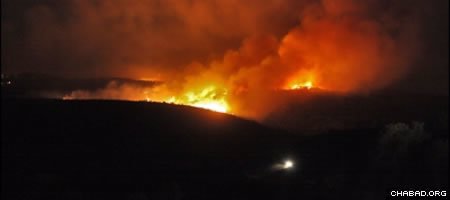Almost 5,000 acres went up in smoke overnight as a wind-fueled wildfire raced across forests in Northern Israel, sending 13,000 people packing and plunging the country into chaos. Hours before the onset of the Jewish Sabbath, fire crews from more than five nations continued to fight the blaze – the worst such disaster to strike Israel in modern history – and citizens mourned the death of 40 prison service staff whose bus was overtaken by quickly-moving flames.
All across the country, people stared at television screens, discerning the latest news reports for some signs of hope. It wasn’t good, and SMS messages, e-mails and phone calls urged everyone to recite Psalms and pray for firefighters to catch a break in a parched, windswept forest that hasn’t seen rain in eight months.
“People are under a lot of pressure and are shocked,” related Rabbi Yehuda Dunin, director of the Achuzat Karmel branch of Chabad-Lubavitch of Haifa.
As his family made preparations Friday morning for the advancing Sabbath, Dunin sent volunteers to the nearby fire lines with sandwiches, water and boxes of the traditional Chanukah fried doughnuts known in Hebrew as sufganiyot. The municipality warned that his area could soon face the prospect of evacuations, but for the time-being, all was safe. A female student from Usifiya, a village where the fire reportedly started from illegal trash burning, sought shelter at the Chabad House. More were due to arrive.
“The fire hasn’t yet reached here, and please G‑d won’t reach here,” said the exasperated rabbi.
In the nearby collection of villages known as the Krayot, Chabad-Lubavitch Rabbi Moshe Shmuel Oirechman and his family were hosting 50 Russian-born children from the Ohr Avner Chabad school in Kfar Citrin after rescue services cleared that village of inhabitants. He said that they could handle more, and were waiting for word.
“The kids are in shock,” said Oirechman. “We gave them a warm welcome: They had pizza for dinner, a full breakfast and we ran some activities. Before they sat down for dinner, they lit their Chanukah menorahs.”
“We left before we were given the official evacuation order to stave off panic,” added Michael Dor, an Ohr Avner supervisor. “We have been in touch with their parents and also made sure there was something on Russian TV to let everyone know they were okay.”
The Magen David Adom ambulance service urged people throughout the country to take in evacuees, and government officials stressed they were doing all they could to extinguish the blaze. Turkey, Greece, Cyprus, Egypt, France, Britain, Spain, Russia, Bulgaria, Croatia and Azerbaijan had all sent aircraft to help in the effort, and the United States was reported to be sending foreign aid.
Untold thousands took to newspaper and social networking websites to offer help.
“We have space for five families,” read one post on Ynet.co.il, the website of the Yediot Ahronot daily newspaper. “We have space for three,” read another.

The immediate priority was “to prevent further loss of life,” The Jerusalem Post quoted Prime Minister Benjamin Netanyahu as saying after speaking to foreign governments, and “to bring the fire under control.”
Earlier that day, when the fire first raged out of control, the 40 prisons service recruits were travelling to the Damon Prison near Kibbutz Beit Oren to help evacuate prisoners. One minute, the fire was well clear of the road through the mountains; the next, flames had engulfed the vehicle.
The fire had moved 1,500 meters in less than three minutes, a firefighter spokesman told The Post.
“The bus had no chance,” he stated.
Kibbutz Beit Oren was destroyed.
West of the fire, Rabbi Shlomo Chaim Lison, director of Chabad of the Western Carmel, said that he was “expecting a miracle.”
“Last night, we saw a fire raging just kilometers away,” he detailed. “My wife didn’t sleep at all last night, and we got bags ready just in case.”
The rabbi said that in the middle of his public Chanukah menorah lighting ceremony, word filtered through the crowd that 40 people had lost their lives. He turned down the music.
“We don’t know why things happen. It is not natural. It’s an international catastrophe. There are no words,” said Lison, his staccato manner of speech underlining the magnitude of it all. “We see airplanes above, and everything looks like a battlefield.
“Please pray for us.”
South of Haifa, in the ancient beachside town of Atlit, Chabad-Lubavitch Rabbi Avraham Sabag said that’s really all people could do at the moment. The village of Nir Etzion – from which, on a clear day, you can see the crashing waves next to Atlit’s fortress – was evacuated; emergency services cut off both of the north-south arteries next to the town for fear that flames could prey upon unsuspecting motorists.
“Here in Atlit, we’re okay, and we want to offer help, but there’s no way to get anywhere,” said Sabag. “We are praying that just as G‑d performed miracles at this time thousands of years ago, miracles will take place in our time.”




Join the Discussion